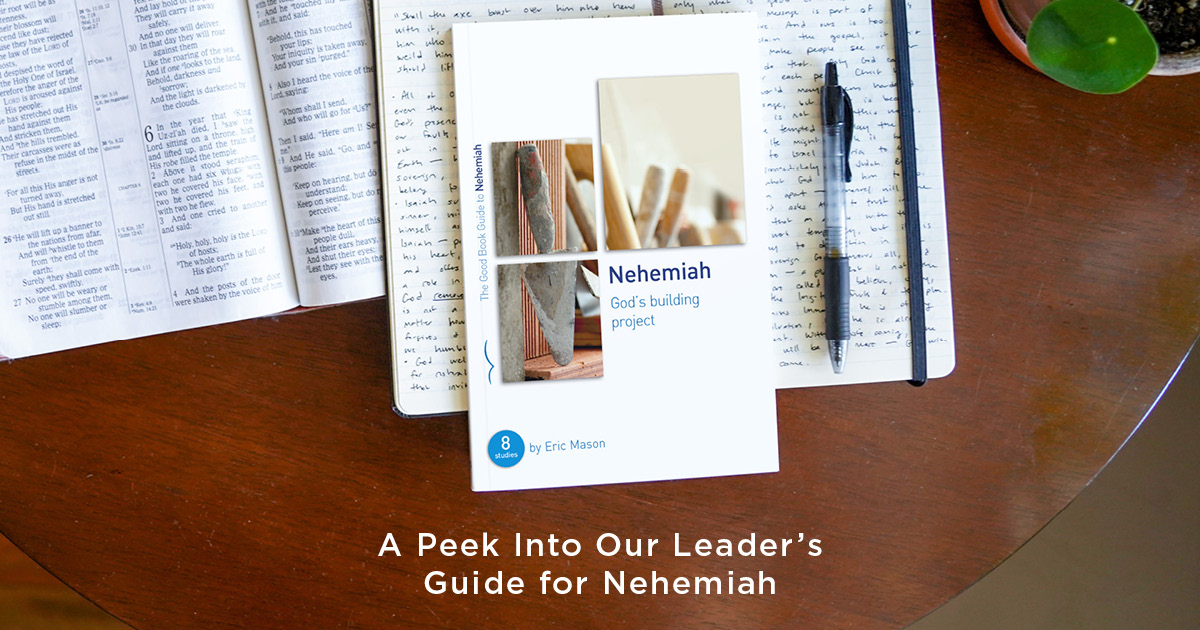
Rebuilding for God
Nehemiah tells the story of the rebuilding of the walls of Jerusalem. God’s people had been in captivity, but God had intervened so that they were allowed to come back to their own land and rebuild their broken city. It’s a key moment in the history of God’s people.
But we won’t walk away from this book with just a rebuilt wall. The book of Nehemiah shows us the work it takes to rebuild representation of the glory of God.
This story has an obvious relevance to any type of rebuilding we might do for God—from our homes and families to our local churches, communities, cities, and government. It shows how, even in the midst of great need, opposition, rebellion, encumbrances, and sins, God still works through his people and motivates us to complete his work.
We can see ourselves and our lives in the book of Nehemiah. But most of all we can see God’s intentions, his glory, and his Son.
Here is a glimpse into the Leader’s Guide at the back of Nehemiah: God’s Building Project. While Good Book Guides can be studied alone, this section is designed to help you as you lead small groups or walk through the book with a partner. Each section corresponds to a question or prompt in the related chapter of the book; in this case, Chapter 7!
People are faithless but God is faithful. That’s our motivation to commit ourselves—and everything we have—to him.
After the celebration of Nehemiah 8, the people assemble again—but this time they are grieving. Chapter 9 contains an overview of the redemptive record of God in the lives of his people. We see some beautiful things about who God is and what he’s done—how he’s always been intervening and helping his people. So why do the people grieve? Because before you can appreciate who God is, you have to know who you’re not. This is a moment of collective repentance.
Write some joke wedding vows. Give each person an unlikely pair of fictional characters, and tell them to write some imaginary vows for their wedding. What kind of thing would they think it important to promise? Some example pairings: Miss Piggy and Mickey Mouse; Mulan and Huckleberry Finn; Princess Leia and Tarzan; Rapunzel and Bilbo Baggins. Or tell the group to choose their own pairings!
1. Why do couples make promises to one another when they get married?
It’s an expression of love and mutual trust. Committing themselves to one another out loud in front of all their friends and family will also motivate them to keep their vows! It’s a moment they can always look back to, even when things get rocky.
2. In the following verses, what do the Levites say about what God is like and what he's done?
• v 6 God is unique—the “Lord ... alone.” He also has a unique level of power. He made the heavens and everything in the world, and preserves them.
• v 7-8 God chose Abraham, named him, and made a covenant with him. He is righteous and keeps his promises.
What strikes you the most about this record of God's dealings with his people? What will you say to him or what will you do as a result?
Encourage the group to reflect on the passage and to marvel at the character of God they see here. Hopefully our response should be to commit ourselves to him, just as the people in Nehemiah’s time did.
Read Galatians 3:10-14 Under the Old Testament law, who is cursed (v 10-11)?
Everyone! If you rely on the law, you will find that you cannot keep it perfectly, and so you will be cursed. “No one is justified before God by the law.”
But how does Jesus change this (v 13)?
Jesus cancels out the curses. He has been cursed for our mistakes. Now we gain blessing (v 14).
How can we express commitment to and trust in God when it comes to...
• our families?
We should be passionate about teaching our children to know and love God. This means leading them in worship, prayer, Bible reading, and practical service. It means giving them good advice about their future and encouraging them to put God first. Trusting in God for our families might also mean trusting him in the pain of infertility or unwanted singleness.
• any other area of life?
This is an opportunity to throw the question open more widely. What commitments do people in your group feel called to make? If the group needs some help with any of these questions, encourage them to look at Hebrews 11:6; Matthew 6:25-34; Romans 14:23. These passages may help kick-start your discussion.
This is a sneak peek into Eric Mason’s Nehemiah: God’s Building Project, which tells the story of a key moment in the history of God's people: the rebuilding of the walls of Jerusalem. But it also has a great deal to say to us about what it means to be part of God's mission.